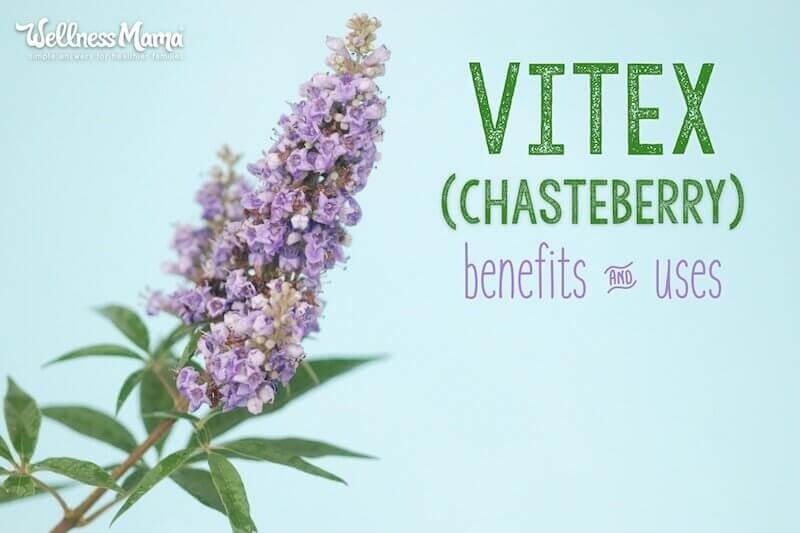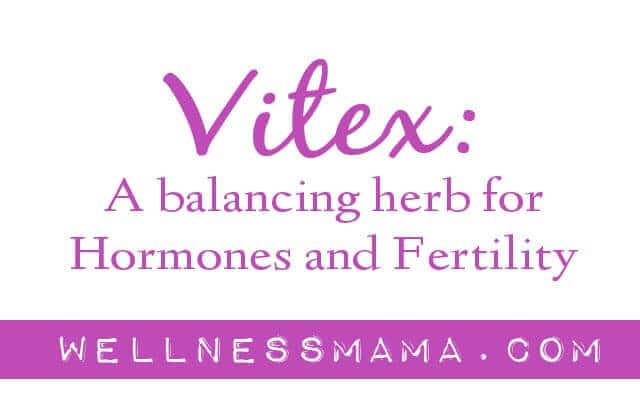Sometimes a plant holds a lot more than meets the eye (many times, actually). I’ve written before about the health benefits of herbs and spices, and today I’d like to cover an herb we don’t hear about every day but that every woman should know about. Ever heard of vitex?
Also called chaste tree or chasteberry, vitex is a large and graceful shrub with purple flowers similar to a lilac. Gardeners love it for its striking blooms and pleasant scent, but those who know about medicinal plants prize it for other reasons.
What Is the Vitex or Chaste Tree Plant?
The vitex plant or chaste berry tree (the Latin is Vitex agnus-castus L., if you want to get technical) is native to Asia and the Mediterranean. Cultures in China, Greece, and Italy used vitex long before its introduction to the United States. Now it’s commonly found in southern gardens because of its ability to withstand warmer temperatures. Vitex is also known as “poor man’s lilac” because of the similarity of the bloom appearance.
In our case, it’s not the landscape we’re after, but the fruit of the chaste tree. This small brown berry (known as the chasteberry) is edible and has a peppery flavor.
Use of the chaste tree berry for medicinal purposes dates back over two thousand years. Many believed chasteberry could suppress libido (although there is no scientific evidence that it does.) The Greek physician Dioscorides prescribed it to soldiers’ wives so they could remain “chaste” while their husbands were away at battle. In the Middle Ages it is said that monks took it to help with the vow of chastity. This is also why chasteberry is known as monk’s pepper.
Vitex Benefits for Female Health
Basically, if you’re a woman, this herb can probably help! When it comes to easing symptoms of PMS — breast tenderness, cramps, cranky mood, and all — vitex is the queen of herbs.
Eases Symptoms of PMS and PCOS
Many clinical trials show chasteberry’s ability to ease PMS and menstrual-related difficulties. Compounds in vitex bind to certain pain receptors, which eases pain in addition to the hormone normalizing effect. In one randomized double-blind, placebo-controlled study (translation: very credible), 178 women took vitex in capsule form for 3 full cycles. Compared to the control group, the women in the test group experienced 50% improvement/reduction in symptoms. These include mood swings, anger, irritability, headache, breast tenderness, and bloating.
This is good news for PMS and even PCOS sufferers, especially with the generally safe profile of this herb.
Supports Progesterone and Luteinizing Hormone
Luteinizing hormone (LH) is important to a healthy reproductive system and largely responsible for triggering ovulation in the body. Studies on chasteberry show the herb supports LH production, which in turn normalizes progesterone and the luteal phase of the menstrual cycle. This is valuable if it corrects a luteal phase defect, which may contribute to infertility and even miscarriages.
For these reasons, vitex is widely prescribed by doctors in Germany and other parts of Europe for endometriosis. (Doctors prescribing natural remedies? It can happen!)
Regulates Irregular Menstrual Cycles
As I mentioned, vitex is especially helpful for those with irregular cycles since it helps balance female hormones. This applies also to those coming off of hormonal birth control, as it can take years for the cycle to completely regulate on its own. I know it’s a controversial subject, but there are many reasons to consider the switch from hormonal birth control to more natural alternatives.
May Help Memory and Brain Function Post-Menopause
Chasteberry’s balancing action on the hormones also may make it useful for some women during menopause. A 2015 study published in Basic and Clinical Neuroscience found that giving rats vitex extract orally improved memory and learning. The thought is that vitex protects against “menopause-related cognitive decline” with fewer side effects (read: cancer risk) than other forms of estrogen replacement.
Less Certain Claims
Some herbalists suggest vitex to help with fertility and even through the first trimester to help prevent miscarriage. While larger studies need to be done in regard to fertility/pregnancy to know its true impact, smaller studies suggest a connection. It is difficult to know the true effect since some of these studies were small pilot studies or used other herbals along with the vitex.
It seems that the claim that vitex can restore missing periods (amenorrhea) are overblown based on current data. At most, the research indicates it may help luteal phase defect by evening out irregular periods.
Interestingly, although many cultures have used vitex to support lactation and boost milk supply, there is little scientific data to support this at this time. This study suggests scientists aren’t really sure if it hurts or helps, so more research is needed.
How Vitex Works
How exactly does a plant accomplish these things? Current scientific understanding suggests that vitex works by regulating and supporting the pituitary gland, which is considered the master gland for hormone production.
This article explains:
There are several different theories about how it works:
- Binding dopamine receptors, which works to reduce secretion of prolactin by the pituitary gland, in turn inhibiting estrogen and progesterone.
- Binding opioid receptors, which decreases the secretion of gonadotropin-releasing hormone.
- Vitex contains many estrogen-like compounds that have an impact on the menstrual cycle.
Since vitex works by correcting hormonal imbalances, it is not a fast-acting drug but a long-term remedy. In studies participants supplemented with vitex for as long as 3-5 months before measuring results.
How to Use Vitex
Vitex is available in capsule form or tincture form. It has a bitter taste, so often capsules or a tincture with other herbs is the best option. The most inexpensive option is to grow or order the dried berries and make a tincture at home. To make a tincture, the proportions from this recipe can be used with just vitex in place of the other herbs.
As I mentioned, vitex acts slowly, so it often takes several months to see its full effect. Since it supports the body’s own hormone cycle rather than providing any hormones itself, it works more slowly while the body adjusts to normal hormone production.
The University of Michigan Health website recommends 4 months of use for noticeable effects, with a daily dosage of 40 drops of tincture/concentrate or 1 capsule (powdered).
Caution/Side Effects of Vitex
Given its long historical use, vitex seems to be a very safe herb. I definitely recommend checking with a doctor before taking even natural supplements or herbs, especially when pregnant or nursing.
Mild and infrequent side effects reported include nausea, headache, stomach upset, and skin irritation. According to this article, women with a history of depression should avoid taking vitex.
Those using hormonal contraceptives should use caution when taking vitex due to its hormonal effects. There’s no evidence that vitex interferes birth control but it makes sense that there could be some interaction.
Finally, be aware that vitex may cause some changes in the menstrual cycle. This will stabilize over time, but if you chart your cycle for natural family planning purposes, expect to see some irregularities while your body adjusts.
It is not recommended for men, though maca is a great fertility-promoting herb for both men and women.
This article was medically reviewed by Jessica Meyers, MPAP, PA-C, RH(AHG), who specializes in herbal protocols and functional medicine. You can also find Jessica on Instagram. As always, this is not personal medical advice and we recommend that you talk with your doctor.
Have you tried vitex before? Will you now? Share below!



Leave a Reply